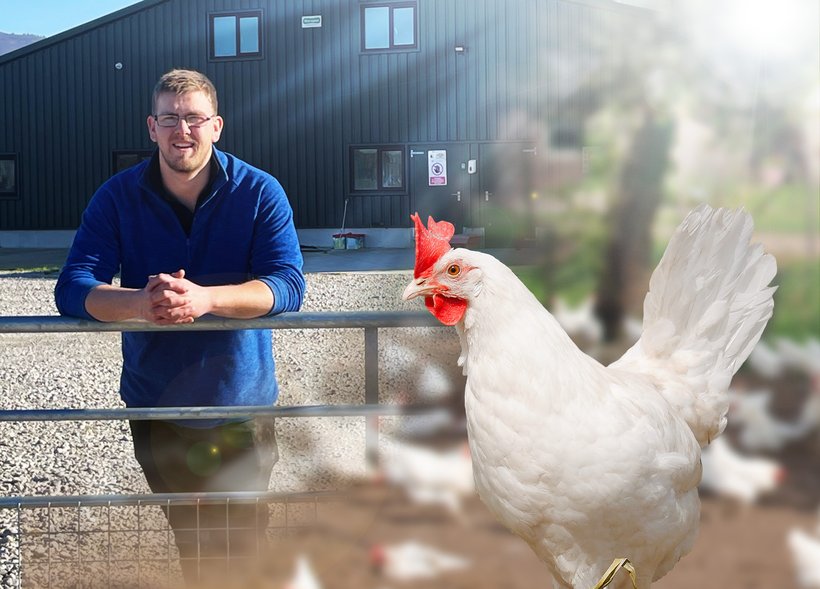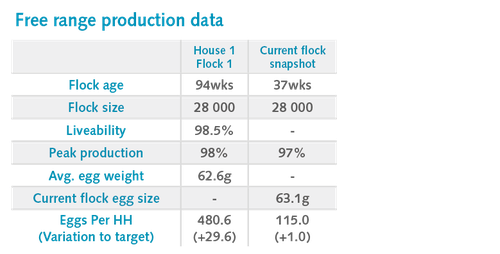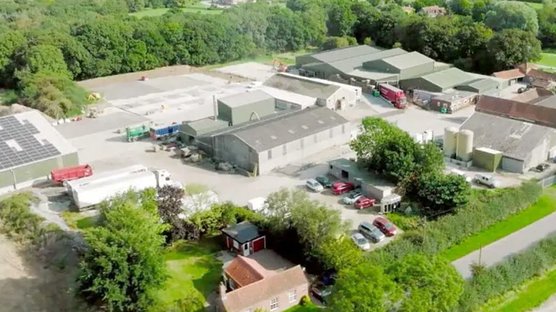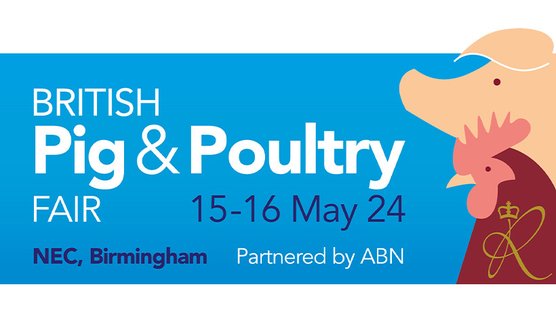
Published on Feb. 23, 2023
Persistence and patience pay off at Plas Llanynys, as Dekalb Whites hit their stride!
Farming is a family tradition at Plas Llanynys, Denbighshire, where Tom Jones was born and grew up on the family dairy farm.
But after his father sadly passed away in 2003, when Tom was just 7 years old, his mum made the difficult decision to sell off the machinery and rented out the farm.
Nevertheless, and with farming in his blood, Tom went on to study agriculture at Reaseheath College, one of the UK’s leading specialist land-based colleges based in Nantwich, Cheshire. After completing his studies, in 2015, Tom worked on dairy farms across Denbighshire, but he was nursing a burning ambition to return to farming on the family farm and follow in his father’s footsteps.
Faced with the challenges of how best to use the limited space at Plas Llanynys, and how to make a successful return home, Tom turned to Richard Davies, and at a meeting with their dairy advisor, they concluded the farm would not profitably sustain cattle. However, the suggestion of poultry emerged, and Tom was introduced to Elaine Rees Jones of Business Wales. Elaine had extensive experience of working in the agricultural sector, providing business advice to farming families on a one-to-one and small group basis. Elaine’s specialist area is farm diversification, with vast experience in setting up free range enterprises.
“I was drawn to the idea of layers rather than broilers because I saw parallels with dairy, Tom explains “I like the idea of farming for what the animal naturally produces rather than raising animals for their eventual slaughter”
Tom and his mother, Debbie then went to meetings organised by Agri Scope along with other prospective producers, where they made contacts with feed companies, vets and equipment companies.
“We gained invaluable insights from these meetings, and they helped my mum in particular to understand the business opportunity.”
Confident that egg production would suit the farm, and allow Tom to work with his mother, they put in a planning application in 2018. Planning approval took two years, and it proved harder than we expected” Tom admits “There aren’t so many egg layer units in our part of Wales mid and we were held back by ammonia fears, due to our location which was within 5k of ancient woodland deemed to be of Special Scientific Interest. However, we were just on the cusp, and eventually we got planning passed by moving the shed literally 200 metres!”
Attracted to the Dekalb White from the start
In 2020, construction work began, and the first flock of 28,000 Dekalb Whites, hatched by Joice and Hill, went into production in 2021. Jim Turner of Wynnstay had introduced Tom to Stonegate, and they suggested a contract for white eggs. “We were attracted to the Dekalb White from the start. The breed offers the smallest carbon footprint through superior feed conversion and less resource use per egg, and that appeals to me.
“The first flock was excellent right from the start, achieving 98.5% at peak of production, so we were gutted to see them go at 94 weeks. The longer laying cycles mean we get extra value from the pullets, and I am confident we will let the second flock, now in production, go to 100 weeks” Tom explains.
A close family-run unit
The business is a close family run unit, managed by Tom, his mother Debbie, and stepdad Rob. The eggs are sold to Stonegate, who supply the pullets, with feed coming from Wynnstay, and veterinary support from Avi Vets. After some deliberation, during the protracted planning process, the family changed their original choice of system and installed a Big Dutchman multi-tier system. “We looked at lots of options, but it was clear that the Big Dutchman was the most popular system in the UK, and we are very happy with the decision” Tom says. “It is an animal-friendly system for free-range egg production. The management system is focused on the welfare of the birds, is easy to understand for the layers, and they can exhibit their natural behaviours, laying their eggs under hygienic conditions.
The Dekalb White has been described as the most productive layer in the world. Tom agrees saying “the whole point of this breed is to lay a lot of eggs, not big eggs. Nevertheless, at 94 weeks the first flock were laying at 88% with an average egg size of 65 grams and only 2.5% mortality. The birds settle much more quickly than brown birds if they do take fright. They are easy to manage, and they react particularly well to light management, and Simon Bowden from Joice and Hill is just a phone call away if I need some technical input from the breeders”.




